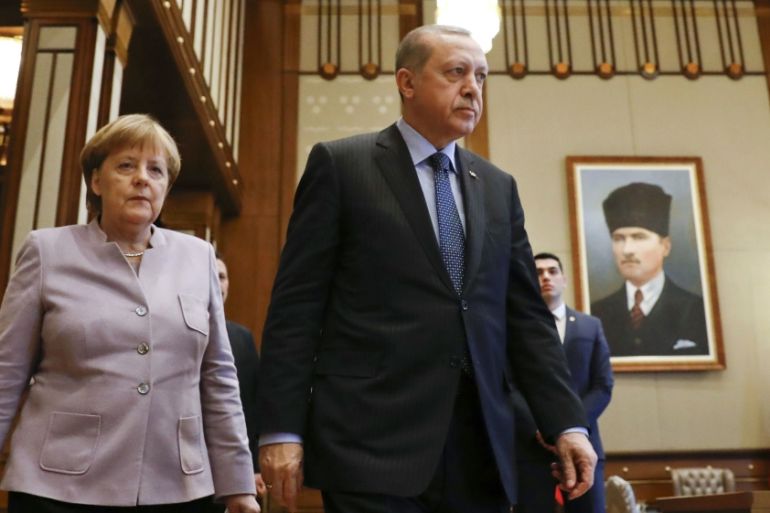Germany angers Turkey with coup remarks and PKK rally
German spy chief unconvinced US-based religious leader was behind failed coup as PKK backers hold rally in Frankfurt.

Germany and Turkey are caught up in a fresh dispute after a rally backing outlawed Kurdish fighters in Turkey was held in Frankfurt and a top German intelligence official made controversial comments on last summer’s failed Turkish coup.
The relations between the two countries are already tense after some German states cancelled and banned political rallies planned by visiting Turkish politicians in the run-up-to a key referendum in Turkey.
Keep reading
list of 4 itemsWhat was Turkey’s failed coup about – and what’s happened since?
Terrorism has no nationality, ethnicity or religion
‘Still not over’: Emotions high 5 years after failed Turkey coup
Turkish citizens in Turkey and abroad will decide on April 16 if they want a set of constitutional changes to significantly expand presidential powers.
RELATED: Erdogan compares Germany rally ban to ‘Nazi practices’
Turkish officials have been further angered after Bruno Kahlmade, the German foreign intelligence chief, said over the weekend that Turkey “failed to convince” Germany that the organisation of Fethullah Gulen was directly behind last year’s coup attempt.
Turkey accuses Gulen, a religious leader who lives in self-imposed exile in the United States, of orchestrating the July 15 coup attempt.
About 300 people, vast majority of them civilians, were killed across Turkey after rebel soldiers attempted to overthrow the government, bombing state buildings and killing civilians and security forces.
‘Parallel state’
Turkish President Recep Tayyip Erdogan has repeatedly said that Gulen’s group was running “a parallel state” within Turkey’s government, taking orders from outside and following an alternative agenda.
However, Kahl, in an interview with Der Spiegel magazine published on Saturday, said: “What we saw following the putsch would have happened regardless, maybe not on the same scale and with such radicalism.”
|
|
Kahl suggested that the Turkish government used the coup attempt as “a pretext” to dismiss civil servants and to imprison dissidents in the country.
Tens of thousands of people were arrested and civil servants were dismissed in purges after the coup attempt.
The Turkish government says these actions are aimed at removing Gulen supporters from inside state institutions.
Kahl defined Gulen’s Hizmet organisation as a “civil association that aims to provide further religious and secular education”.
He said the failed coup “was not initiated by the [Turkish] state”, adding that “before July 15, a big purge by the government was already under way.”
Speaking to Al Jazeera on Sunday, Ahmet Iyimaya, a senior MP of Turkey’s ruling Justice and Development Party (AK Party), said Kahl “was not acting with goodwill” in saying that he was not convinced of Gulen’s responsibility in the coup bid.
RELATED: Turkey – Coup plotters ‘acted early’ in fear of arrests
“I believe the German intelligence is well aware that Gulen’s movement is behind this putsch,” Iyimaya said, adding that he had heard personal accounts of bureaucrats backing Gulen at the night of the failed coup.
Iyimaya, who also leads the parliament’s justice commission, said: “Turkish intelligence and other institutions can provide Germany with extensive proof if Germans are willing to talk to them.
“If they want, they can come to Turkey anytime to go through the evidence and testimonies.”
Rally in Frankfurt
In a separate development on Sunday, Turkey condemned a rally held in Frankfurt with banners and posters affiliated with the outlawed Kurdistan Workers’ Party (PKK) on display.
Thousands of people turned up for the rally, which took place on Saturday, marking the beginning of the annual Newroz festival for Kurds.
|
|
The PKK is listed as a “terrorist” organisation by the European Union and US.
Turkey’s foreign ministry expressed its displeasure to Germany’s ambassador in Ankara, according to a statement by the ministry.
Participants at the Frankfurt rally waved PKK flags and shouted support for “No” vote in the upcoming referendum.
A “Yes” vote would introduce an executive presidency advocated by the government and Erdogan.
Iyimaya told Al Jazeera that there is a “growing double standard” against Turkey in certain European countries, such as Germany.
“Instead of consistently following their principles, Germany and some other countries change positions according to their interests and who they deal with,” he told Al Jazeera, pointing out that Germany recognises the PKK as a “terrorist” group.
Iyimaya said certain European countries are “acting in an obvious way” against the constitutional changes that would be put into referendum next month.
Follow Umut Uras on Twitter: @Um_Uras
|
|